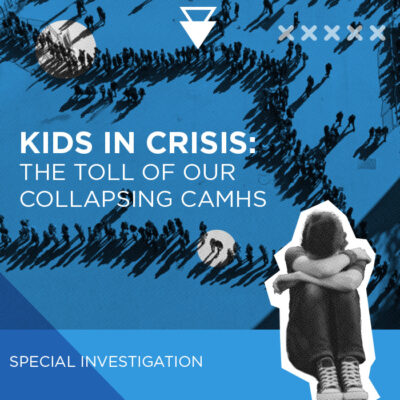Government has “not grasped” the child mental health services “crisis”, say Lords who warn landmark legislation has “failed” to improve young people’s lives.
The cross-party Children and Families Act 2014 committee found the legislation has “largely sat on the shelf” and “languished” as a result of poor implementation, inadequate scrutiny and “incessant churn” among ministers.
The act was aimed at giving greater protection to vulnerable children, those with special needs, and to help families where the parents are separating.
The committee, made up of 12 Lords, also looked at what the act didn’t cover, but impacted many aspects of the law, including children and adolescent mental health services (CAMHS).
Lords are “deeply concerned” about the state of CAMHS, adding “they are in crisis. This is a grave threat both to the success of individual provisions of the act and to its overarching aim of enhancing the lives of children and their families”.
“The government, in allowing the services to deteriorate to this level, has shown it has not grasped the importance and severity of this problem.”
A four-month Schools Week investigation revealed how suicidal children were being turned away from overstretched CAMHS with schools instead told to “keep them safe”.
A year on, headteachers now fear it will take a “Baby P” incident in their classroom to trigger proper support to deal with the “new normal” of heightened mental health issues.
New NHS data shows how the rate of probable mental disorders in school-aged children remains at 1 in 6, up from 1 in 9 pre-pandemic.
NHS figures show 733,000 children and young people were in contact with mental health services in the 2021-22 financial year, compared with 398,000 in 2018-19.
Parents told the committee how their teenage children had attempted suicide up to three times while waiting for CAMHS services, while others said services were “non existent apart from in extreme crisis”.
SEND system ‘failing children’
Lords said important early intervention, to reduce high-cost interventions later down the line, “remained absent across many of the areas we looked at, threatening the stability of families and the health of children and young people”.
“It is clear to us that the government need to fully grasp this fact across many areas of the act.”
They also warned that high turn over rates in positions of power – including ministers and officials as we have seen this year – can “hamper efforts to deliver consistent and high-quality services”.
The special educational needs and disabilities (SEND) system is “failing many children”, Lords said. In its response to SEND review it pushed for more accountability, reform of funding mechanisms and a “clear implementation plan”.
As revealed by Schools Week, the SEND review response has been delayed until the new year.
A Department for Health and Social Care spokesperson said “it is important we do everything we can to support children and young people with their mental health”.
“We are already investing £2.3 billion a year into mental health services, meaning an additional 345,000 children and young people will be able to access NHS-funded mental health support they need by 2024.
“Support in school is vital, and we are committed to increasing the number of mental health teams to almost 400 by April 2023, providing support to three million children and young people.”

















Your thoughts